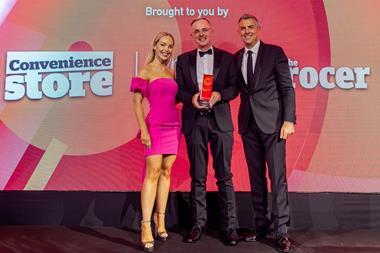Offering local products is something that the big multiples can’t do as well as independents. Here’s how four retailers make it a selling point.
Sandeep Bains
Simply Fresh, Faversham, Kent
Social media is just one of the ways Sandeep finds local suppliers for his Simply Fresh store
Rav Garcha
Nisa Local, West Midlands
Rav balances more than 20 local suppliers across his four stores to give his business a point of difference
Binny Amin
Budgens and Londis, Whitstable
Kent Binny hosts local produce open days to gauge customer reaction
John Perrett
Spar Hunnyhill, Isle of Wight
John is always open to new products produced near to his 13 stores on the Isle of Wight
How many local suppliers do you use at your store?
Sandeep: We have about 20-25 local suppliers across most categories. We stock ales from a local microbrewery as well as cherries and strawberries from Kent.
Rav: We use about 20 local suppliers across the four stores at any one time, with a lot of them focusing on fresh and chilled produce.
Binny: Across both of our stores we use nine local suppliers, mainly in the fresh and grocery categories. We stock a lot of jams and chutneys at the store.
John: The economies of scale can make it difficult to source viable local suppliers who are willing to distribute on the Isle of Wight. Some on the island even have to ship it to the mainland and back again! We do have some good local suppliers, though, including an Isle of Wight ice cream, biltong, bakery and flour from the local mill.
What made you decide to stock local goods?
Sandeep: It’s a big focus for all Simply Fresh stores and it enables us to offer something that the multiples don’t.
Rav: When we heard that other stores had success with local produce we decided to give it a try. It creates a great USP for a small store.
Binny: We spoke to our customers about the possibility of stocking local products and they seemed to want them. We went around farmers’ markets and saw how big the sector was and decided it would work in our stores.
John: It’s always been part of our ethos to support local suppliers and there’s definitely a perception among customers that locally-produced goods are better than big-name brands. I’m sure people from every area feel the same way.
How have customers reacted to the local products?
Sandeep: Very well. In an ideal world everyone would like to buy all locally-supplied products, but that’s not always possible. It’s something that consumers are interested in and given the choice I think they’ll always go for the local product over the big-name brand.
Rav: Customers love them. We’ve had to increase the number of deliveries of our local bread supplier, Valley Bakeries, to four days a week to cope with the demand.
Binny: Customer reaction is very positive. Products have that extra personal feel that customers respond to. We’ve used sampling days to drum up enthusiasm among customers.
John: Customers are very positive towards them. Shoppers are still quite price conscious so these products have to represent value; not necessarily the cheapest on the shelf, but good value.
How do you get in contact with suppliers whose goods you want to stock?
Sandeep: Some contact me because they know the store already stocks local produce, while I’ll research options that I come across. Twitter is a good source of contacts and I’ve got a couple of my suppliers through that.
Rav: If you get a reputation as a good stockist of local suppliers then they’ll come to you, but starting out you’ll need to find them. There are companies that will source products manufactured near you so it may be worth contacting them.
Binny: We have a look at social media to see who is on there and will visit farmers’ markets to have a look at what’s on offer. Some suppliers come to us as well.
John: They come to us as they know we’re a store that will at least consider stocking them.
Do you merchandise your locally-supplied products together, or in their respective categories?
Sandeep: All the products are merchandised within their own category rather than on a special display, so that customers will see them when they’re looking for similar products. You don’t want to make it too difficult for customers to find the products.
Rav: I put them alongside the big-brand equivalent. Nobody leaves the house with a plan of buying something made locally; they’re more likely to be looking in that category so locally-sourced alternatives are better placed there.
Binny: At first we’ll display them on their own to create awareness and then we’ll look at the range and trim it back to the lines that are successful. Then we’ll stock it with its appropriate category once customers get used to it.
John: We merchandise them separately with signage so they don’t get lost within a fixture. You need to make it easy for the customer to find the products. We stock some flour from the local mill and I know that if we stocked it on the same shelf as the branded flours, customers might overlook it.
How do you decide which lines to stock?
Sandeep: We’ll talk to our customers and see what they think before stocking something. We look at what has been successful previously and see how it compares. From a provenance point of view, once they’re located in Kent that’s good enough for us.
Rav: We’ll try anything to see if it works and will always look to get something on sale or return to minimise risk. The more information you have about the product the better as that can be passed on to the customer, which always works well. If it’s from the county we’ll stock it as a local supplier, but if it’s from outside we’ll stock it as a British brand.
Binny: We have some very stringent tests to decide which local suppliers to use. They have to meet our delivery demands and health and safety checks to make sure that the product is suitable to be sold in the store. We’ll also do taste tests and sampling days to see if they’re of good enough quality. I don’t worry too much about how close the supplier is - we have some from the North of England. We just label it differently.
John: My first instinct is to say yes to everything and give it a six-month trial. Unless there’s some logistical reason for it not to work, I’ll always try to get them into the stores. So far every product we’ve trialled has been successful and we’ve continued stocking it. We also have a policy of stocking a product in all 13 of our stores so we’re consistent across our estate.
How do you promote locally-supplied products?
Sandeep: We work with the supplier so that both our customer bases know where they can get the product. We also have ‘try me, I’m local’ signs on any locally-sourced product to attract attention.
Rav: We try to let the product tell the story and put up some POS. We put up a small picture of the lady who made our jam and a bit about her, and that month her product outsold all other jams.
Binny: We have sampling days for suppliers and let customers try the products and meet the people who make them. We also have tailored POS for each product which shows where it’s from, who makes it, what their ambitions are and what’s in it. This really grabs customers’ attention.
John: We take out adverts in the local papers, letting customers know what local products we have, plus we have POS material on-shelf to highlight them.
If a supplier started selling to the multiples, would you stop stocking them?
Sandeep: No, because at the end of the day they’re in business as well. One or two of my local suppliers also stock a supermarket near me and it doesn’t affect sales at all. The more successful the business, the better it is for everyone.
Rav: It would depend on the situation. Either way it can be turned into a positive. If the product is seen in the multiples then more people will know it and if you decide not to stock it anymore then you have space for something else.
Binny: Not necessarily. In fact, we’ve told other stores about some suppliers. The more the product is sold and seen around, the more successful it will be.
John: Not at all. Some of our suppliers deal with Co-operative stores on the island and we’re happy for that to happen. We need them to be successful.
How does your local offer integrate with your main supplier or wholesaler?
Sandeep: We’re supplied by P&H and once we make our weekly minimum quota they don’t mind what other local products we stock.
Rav: It plays a part in the store’s overall range and our wholesaler doesn’t mind which local products we stock as it improves the store, which is good for everyone concerned.
John: By choice we purchase 98% of our stock through Appleby Westward and they’re quite supportive of us stocking local suppliers. It’s part of the mix of the store and they’re happy for us to keep doing it.
What could suppliers of big brands learn from the smaller local suppliers?
Sandeep: Local suppliers know how to interact better, and retailers always want to be able to meet the people they’re working with face to face, rather than having to call someone on the phone.
Rav: Focus more on the local aspect. Red Bull does it quite well - they have promotions tailored to regions and they always work really well because they resonate more with customers.
Binny: The personal touch and the fact that they will go the extra mile for the brand. Big-name brands have all the marketing support and will provide POS, but the smaller suppliers will go to stores to meet customers, providing that extra touch.
John: It would be nice if the larger suppliers knew a little more about independent retailers and what we need to run our businesses. There isn’t so much contact between these larger brands and retailers and I think they’d really benefit from it.
What do you do if a local supplier lets you down? Do you have contingency plans in place?
Sandeep: While it’s not always ideal, these things do happen and if, for example, our strawberry supplier just doesn’t have any strawberries, there’s not much they can do about it. We work with our suppliers closely and try to anticipate any problems so they don’t cause too big an issue.
Rav: It hasn’t happened yet. We’re more likely to be late putting the order in than the supplier being late. I don’t think it’s much of an issue really as a lot of these products aren’t a direct replacement for another product.
Binny: It’s never happened. We are careful about the suppliers we choose and make them aware of the number of deliveries we expect from them on a weekly basis. If they don’t think they can meet this then we won’t use them. We were in talks with one supplier who could deliver only once a month and that just wasn’t enough for us, despite it being a great product.
John: We work closely with suppliers and they let us know if there’s going to be a problem. There’s never been a situation where they’ve let us down.
Each month a selection of C-Store Champions share their experience on a given topic. The C-Store Champions are professional retailers who believe in continual development of their business. If you have a topic you’d like debated, or would like to join the panel, contact aidan.fortune@wrbm.com, or phone 01293 610222
Source
Aidan Fortune
















![C-Store_Champions_logo-CHOSEN[1] 2023](https://d2dyh47stel7w4.cloudfront.net/Pictures/380x253/6/5/7/301657_cstore_champions_logochosen12023_817064.jpg)




No comments yet